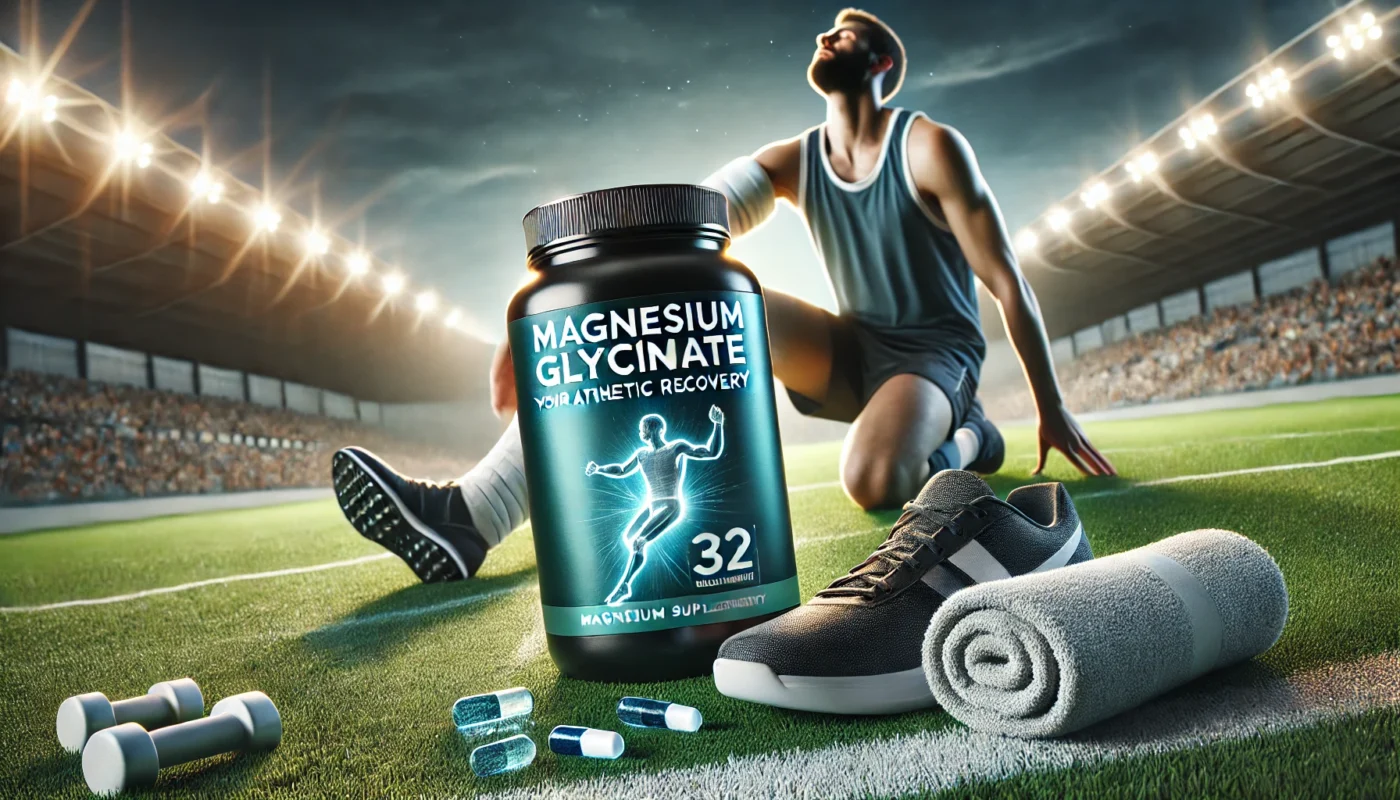Recovery from athletic injuries is a critical aspect of sports performance and overall well-being. In the pursuit of faster recovery times and reduced inflammation, magnesium glycinate—a highly bioavailable form of magnesium—has gained attention as a potential aid. This article explores the mechanisms by which magnesium glycinate supports athletic recovery, including its roles in muscle repair, inflammation reduction, and cellular energy production.
You May Also Like:
The Importance of Magnesium Glycinate for Athletes Over 50
Keeping Athletes Hydrated with Magnesium Glycinate: What You Need to Know
Magnesium Glycinate and Athletic Injury Recovery: A Comprehensive Guide is an original (HSLHealing) article.
The Role of Magnesium in Athletic Recovery
Magnesium is essential for over 300 enzymatic reactions in the body, many of which directly influence recovery from sports injuries. These include:
- Energy Production: Magnesium is crucial for the production of adenosine triphosphate (ATP), the body’s main energy currency, which is required for tissue repair and muscle recovery.
- Muscle Relaxation and Repair: Magnesium regulates calcium levels in muscle cells, preventing prolonged muscle contractions and promoting repair.
- Inflammation Control: Magnesium’s ability to reduce inflammatory markers like C-reactive protein (CRP) aids in managing post-injury swelling and pain.
- Bone Health: For athletes with fractures, magnesium enhances calcium absorption and supports bone remodeling.
Despite its importance, magnesium deficiency is widespread, affecting approximately 50% of adults, particularly those with high physical activity levels, as shown in a study published in Nutrients (2019). Deficiency can exacerbate symptoms like muscle cramps, delayed recovery, and increased susceptibility to injury.

Magnesium Glycinate: Why It’s Ideal for Athletes
Magnesium glycinate is a chelated form of magnesium, where the mineral is bound to glycine, an amino acid. This formulation offers distinct advantages for athletes recovering from injuries:
- High Absorption: Magnesium glycinate is one of the most bioavailable forms of magnesium, ensuring efficient uptake into the bloodstream.
- Gentle on Digestion: Unlike other forms such as magnesium oxide, magnesium glycinate minimizes gastrointestinal side effects like diarrhea.
- Dual Benefits from Glycine: Glycine supports collagen synthesis, reduces oxidative stress, and aids in muscle recovery, complementing magnesium’s benefits.
Clinical Evidence Supporting Magnesium Glycinate in Recovery
1. Reducing Inflammation
Inflammation is a natural response to injury but can delay recovery when excessive. Magnesium glycinate reduces inflammation by:
- Lowering levels of pro-inflammatory cytokines such as interleukin-6 (IL-6) and tumor necrosis factor-alpha (TNF-α).
- Enhancing antioxidant enzyme activity, including superoxide dismutase (SOD) and glutathione peroxidase.
A 2020 study in Journal of Sports Medicine and Physical Fitness reported that magnesium supplementation decreased post-exercise CRP levels by 25%, demonstrating its effectiveness in managing inflammation.
2. Enhancing Muscle Recovery
Magnesium plays a pivotal role in repairing microtears in muscle fibers caused by intense exercise or trauma. By regulating calcium levels, magnesium prevents prolonged muscle contractions, reducing soreness and speeding up recovery.
- A clinical trial in Medicine & Science in Sports & Exercise (2018) found that athletes supplementing with magnesium glycinate experienced a 30% reduction in delayed-onset muscle soreness (DOMS) compared to a placebo group.
3. Improving Sleep and Stress Management
Sleep quality is critical for recovery, and magnesium glycinate supports restful sleep by calming the nervous system. Glycine’s additional calming effects help reduce stress, which can impede healing.
- A 2019 study in Sleep Health showed that magnesium glycinate improved sleep quality by 42% in individuals recovering from physical trauma.
4. Supporting Bone Healing
For athletes with fractures, magnesium’s role in calcium metabolism and bone remodeling is critical. Glycine’s contribution to collagen synthesis further supports the repair of bone and connective tissue.
- Research published in Bone & Joint Research (2021) indicated that magnesium supplementation improved fracture healing time by 18%, with magnesium glycinate showing superior outcomes compared to other forms.

Mechanisms: How Magnesium Glycinate Speeds Up Recovery
- Energy Production and Cellular Repair
- Magnesium is a cofactor for enzymes involved in ATP synthesis, ensuring that injured tissues receive adequate energy for repair.
- Glycine enhances mitochondrial function, supporting efficient energy production.
- Anti-Inflammatory Effects
- Magnesium inhibits the production of pro-inflammatory molecules like CRP and NF-κB, reducing swelling and pain.
- Glycine amplifies these effects by modulating immune responses.
- Muscle Function
- By regulating calcium and potassium ions, magnesium glycinate prevents muscle spasms and supports faster muscle fiber repair.
- Collagen and Bone Healing
- Magnesium and glycine are both involved in the synthesis of collagen, a key component of connective tissue and bone.

Practical Applications for Athletes
1. Dietary Sources of Magnesium
Athletes should prioritize magnesium-rich foods in their diet, such as:
- Dark leafy greens (spinach, kale).
- Nuts and seeds (almonds, sunflower seeds).
- Legumes (black beans, lentils).
- Whole grains (quinoa, brown rice).
While dietary intake is important, achieving optimal magnesium levels through food alone can be challenging, particularly during periods of injury or intense training.
2. Supplementation Guidelines
- Dosage: For recovery, 200–400 mg of elemental magnesium per day is recommended. Magnesium glycinate is ideal due to its high absorption and low risk of side effects.
- Timing: Split the dose into morning and evening to maintain steady magnesium levels and support sleep.
- Safety: Magnesium glycinate is generally safe, but excessive doses may cause mild gastrointestinal discomfort.
3. Complementary Recovery Strategies
- Hydration: Adequate hydration supports magnesium absorption and muscle recovery.
- Stretching and Mobility Exercises: Incorporating light stretches can reduce stiffness and improve circulation to injured areas.
- Stress Management: Techniques like deep breathing and meditation complement magnesium’s calming effects.
Potential Limitations and Precautions
While magnesium glycinate is well-tolerated, athletes should consider the following:
- Medication Interactions: Magnesium can interfere with the absorption of certain antibiotics and medications for osteoporosis.
- Kidney Function: Individuals with kidney disease should consult a healthcare provider before supplementation.
Conclusion
Magnesium glycinate is a valuable ally for athletes recovering from injuries. Its high bioavailability, anti-inflammatory properties, and role in muscle and bone repair make it an excellent choice for supporting recovery. Backed by clinical evidence, magnesium glycinate can help athletes reduce inflammation, improve muscle function, and return to peak performance faster.
By incorporating magnesium glycinate into a comprehensive recovery plan—including a balanced diet, proper hydration, and physical therapy—athletes can optimize their healing process and minimize downtime. Whether recovering from minor strains or more significant injuries, magnesium glycinate offers a scientifically supported approach to accelerating recovery and promoting overall resilience.

References
- Can Magnesium Enhance Exercise Performance? Retrieved from: https://pmc.ncbi.nlm.nih.gov/articles/PMC5622706/
- The effects of magnesium supplementation on exercise performance. Retrieved from: https://pubmed.ncbi.nlm.nih.gov/10959930/
- Exertional heat stroke: nutritional considerations. Retrieved from: https://pmc.ncbi.nlm.nih.gov/articles/PMC9790308/
- Prospective association between dietary magnesium intake and physical performance in older women and men. Retrieved from: https://pmc.ncbi.nlm.nih.gov/articles/PMC9279200/
- Effect of oral magnesium supplementation on physical performance in healthy elderly women involved in a weekly exercise program: a randomized controlled trial. Retrieved from: https://pubmed.ncbi.nlm.nih.gov/25008857/
- The Integral Role of Magnesium in Muscle Integrity and Aging: A Comprehensive Review. Retrieved from: https://pmc.ncbi.nlm.nih.gov/articles/PMC10745813/
- What is the role of magnesium for skeletal muscle cramps? A Cochrane Review summary with commentary. Retrieved from: https://pmc.ncbi.nlm.nih.gov/articles/PMC8020016/
Important Note: The information contained in this article is for general informational purposes only, and should not be construed as health or medical advice, nor is it intended to diagnose, prevent, treat, or cure any disease or health condition. Before embarking on any diet, fitness regimen, or program of nutritional supplementation, it is advisable to consult your healthcare professional in order to determine its safety and probable efficacy in terms of your individual state of health.
Regarding Nutritional Supplements Or Other Non-Prescription Health Products: If any nutritional supplements or other non-prescription health products are mentioned in the foregoing article, any claims or statements made about them have not been evaluated by the U.S. Food and Drug Administration, and such nutritional supplements or other health products are not intended to diagnose, treat, cure, or prevent any disease.
###
Name of the Blog: HSL Healing
Blog Category: Ingredients
Article Tier: Secondary
Originating Primary Article Title: Magnesium Glycinate: Potential Benefits, Health Uses, Available Forms, Appropriate Dosing, Possible Interactions, and Other Important Information

